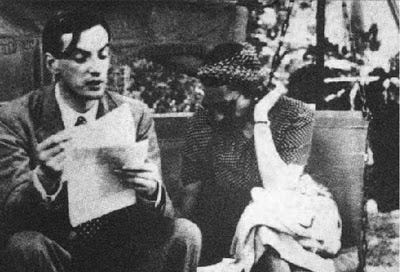To the extent that power is less about ethics than ethology —especially given our postlogical framing for it— I’d like to share some cursory observations on three indispensable texts to build some first notes concerning aggression. These are: Robert Ardrey’s The Territorial Imperative; Konrad Lorenz’s classic On Aggression, and Roger Caillois’s criminally understudied “Aggressiveness as a Value”.
I am not aware that these three texts have been dealt with in parallel, or that the authors were aware of each other’s work. To not abuse your time or attention, the comparisons, kept simple, are as follows:
Lorenz, an Austrian zoologist, was awarded the 1973 Nobel Prize in Physiology and Medicine for his book. He is a founder of the study of ethology, or animal behaviour, which extends to us, and often shows our backlit contours. Most of his examples hail from the animal world, but he steps —even empirically— into issues of current interest such as mass panics and confinement, to end his book with nothing less than an “Avowal of Optimism”.
Ardrey was —like we recently said of Roussel in Covidian Æsthetics— a theatre man1 —a more and more apparent pattern in our line of inquiry— who assumed an unusual trajectory by conducting searingly lyric and insightful “personal investigations” into the drama of human evolution; so I situate him between Lorenz and Caillois.2 A simple claim for now —as we will get into the weeds later— is that deep history and deep play dovetail inextricably into each other. History is, to some extent, written by the better brinksmen.
Of the three, it is however Caillois who discusses aggression in terms of social, elite capture through conquest —and contagion (hence acknowledging its mimetic implications), which it is why I’d like to start with him tomorrow. As the title indicates, this is an axiological text, meant to propose a “new order“ —that which what, as opposed to further maligning chaos, I have previously described as the antithesis to previous order—. It is also, as is so much of his writing, a screed in part directed at —and contra— Bataille, to whom I am so partial as to be a dedicated reader of Caillois.3 Theirs remains the most compelling rivalry in the history of Surrealism, and the most conceptually invigorating of them all.4 “Aggressiveness as a Value” —alongside with several of its sister pieces— is inscribed within a broader conversation surrounding Acéphale, so some context will be needfully provided.
Something else that must be said for Caillois is that he ranks among the greater 20th century scholars of play and games, after Huizinga. This is not incidental to our thesis on aggression, deep play and power. Les Jeux et les Hommes is a (very Bataillian) study that describes four different types of play: competition, chance, simulation and vertigo (categories I will furthermore revisit as we continue our exploration of AI art generators at Covidian Æsthetics).
With this post we start laying out the central connections between aggression and deep play, which are critical to our study of power and aesthetics.
I may refine and adjust this post as its successors develop.
Photo of Roger Caillois and Victoria Ocampo in Buenos Aires, circa 1939.
Robert Ardrey. The Territorial Imperative: A Personal Investigation into the Animal Origins of Property and Nations. Delaware: Storydesign Limited, 2014 [1966].
Georges Bataille. The Sacred Conspiracy. The Internal Papers of the Secret Society of Acéphale and Lectures to the College of Sociology. London: Atlas Press, 2017.
Roger Caillois. The Edge of Surrealism: A Roger Caillois Reader (ed. by Claudine Frank, L’aggressivité comme valeur). Durham/London: Duke University Press, 2003 [1937].
Konrad Lorenz. On Aggression (trans. by Marjorie Kerr Wilson). California: Harcourt, Inc., 2017 [1973].
A theatre man is the opposite of a theatre kid. It is hardly accidental that the Biden administration is beset by theatre kids and utterly bereft of dramaturges.
At least in the short term, we will be visiting his Territorial Imperative and his Social Contract while doling out Prudence’s advice on power.
I actually came to Bataille via Caillois while moonlighting as a student in Montevideo.
Nor was this tension always so. In 1936, during the embryonic stirrings of Acéphale —which would be born in February of 1937 and expire in October of 1939—, a powerful rapprochement between the two generated a stir among the members of the Sociological Group, which had just “turned a page and openly declared its religious character” vis-à-vis Contre-Attaque. The resonances at this point between Bataille and Caillois can be seen in his defense of a “militant orthodoxy” as described in the essay we will soon discuss. The breakdown of the bromance between the two began when they both spoke at the launch of Acéphale 2 in March, continued through the constitution of the College, and eventually imploded in 1939, with the College’s termination.




